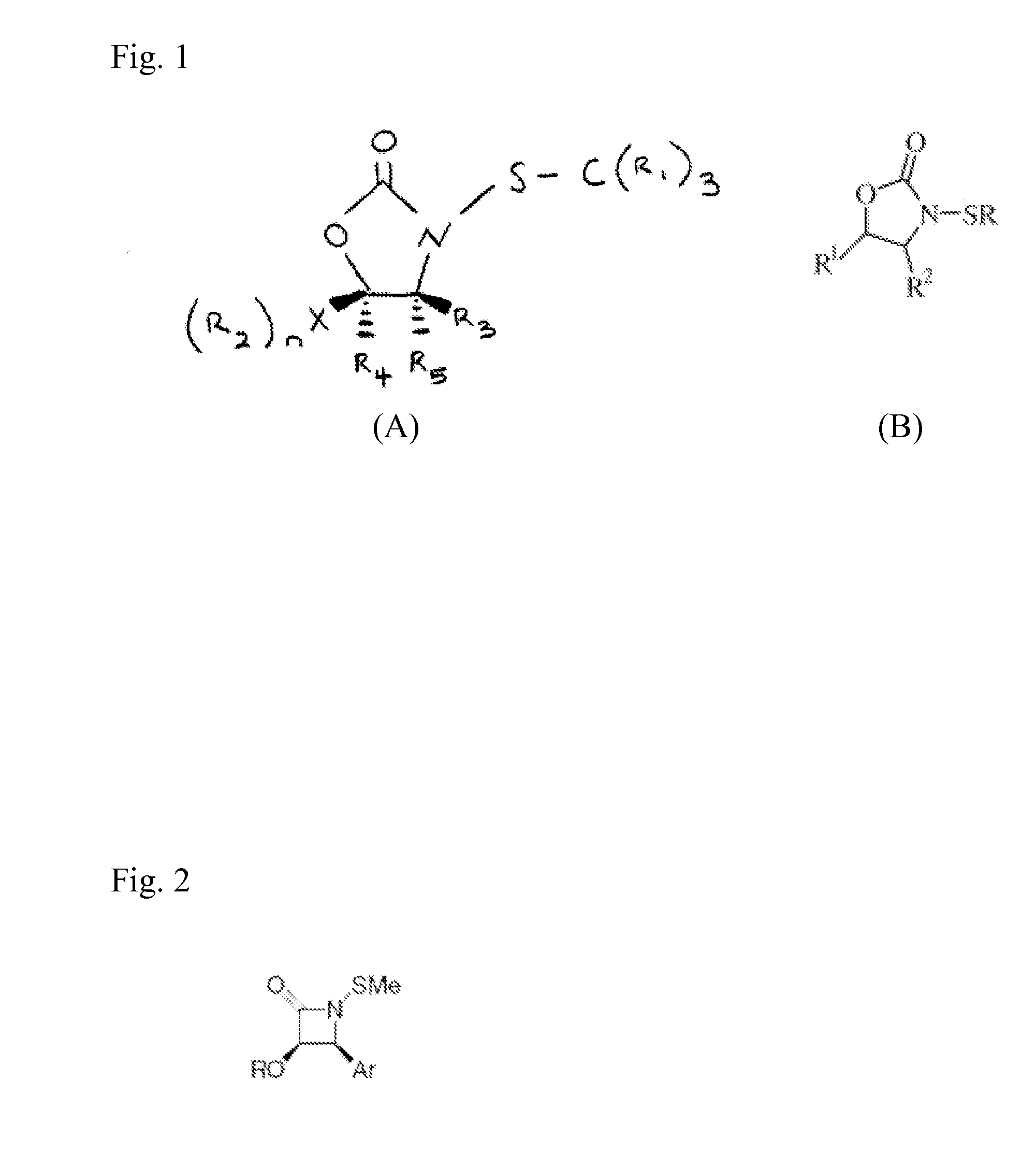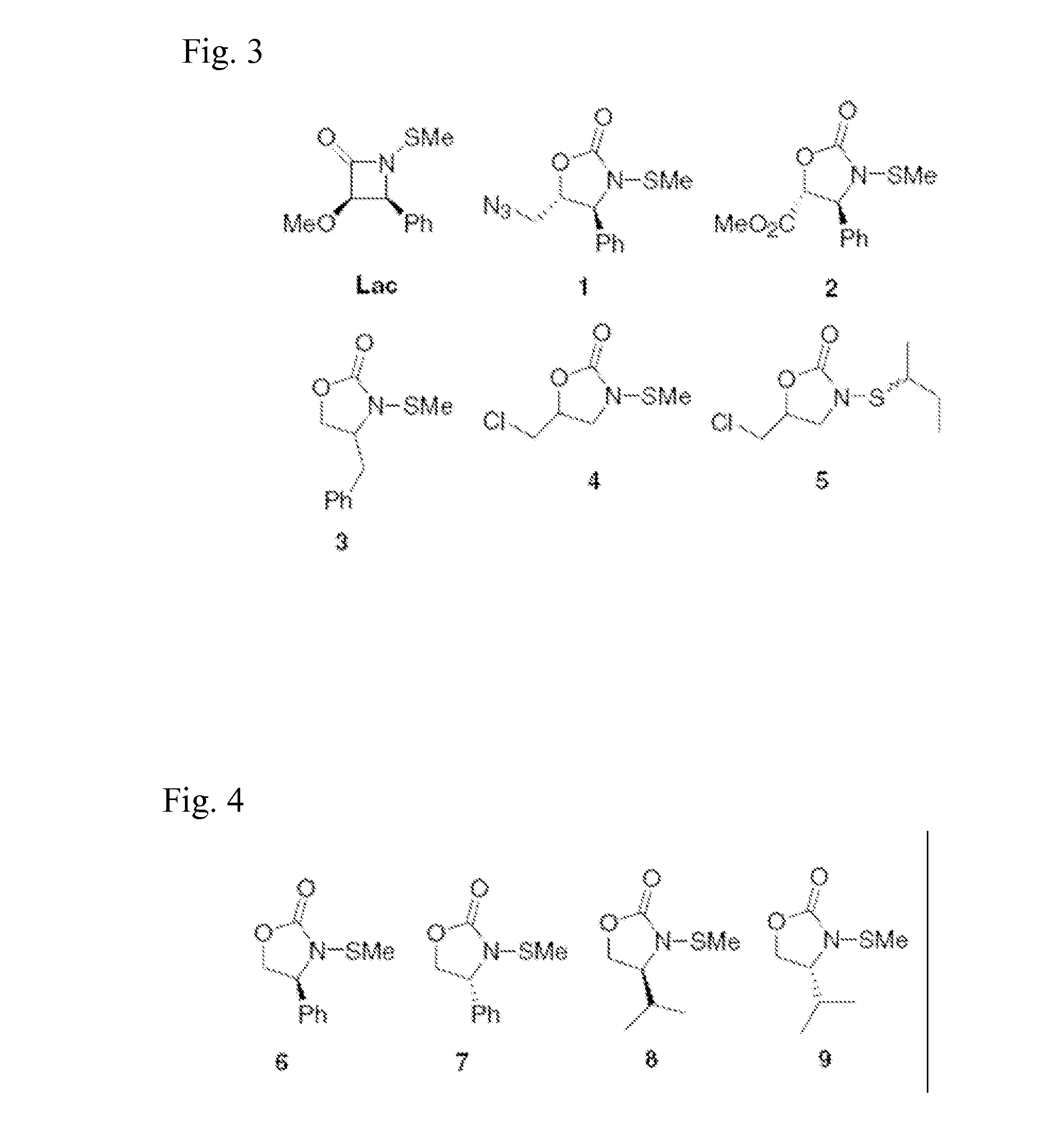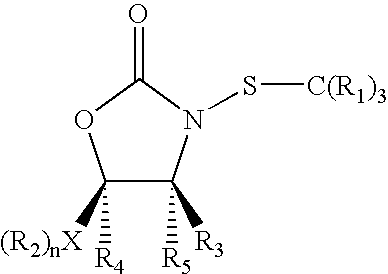N-Thiolated 2 Oxazolidone Antibiotics
a technology of oxazolidone and thiolated oxazolidone, which is applied in the direction of antibacterial agents, biocide, heterocyclic compound active ingredients, etc., can solve the problems of alarming increase in bacterial resistance to existing agents, slowed introduction of new antibiotics, and bacterial drug resistance has reached a crisis level
- Summary
- Abstract
- Description
- Claims
- Application Information
AI Technical Summary
Benefits of technology
Problems solved by technology
Method used
Image
Examples
example 1
[0064] In accordance with the present invention, a representative selection of differentially substituted N-thiolated 2-oxazolidinones 1-9 was prepared for antimicrobial screening by N-thiolation of the corresponding 2-oxazolidinones using protocols that have been previously reported by Miller and co-workers (Woulfe, S. R. et al., Tetrahedron Lett. 1985, 26, 3891) for β-lactams. The structures of the compounds were confirmed by 1H and 13C NMR spectroscopy, and antibacterial assays were performed by Kirby-Bauer disk diffusion on agar plates according to NCCLS guidelines. (NCCLS (National Committee for Clinical Laboratory Standards) Methods for Dilution of Antimicrobial Susceptibility Tests for Bacteria that Grow Aerobically. NCCLS Document M7-A4, Vol. 17, No. 2, 1997) For these assays, we tested both an ATCC strain of methicillin-susceptible S. aureus as well as 10 strains of methicillin-resistant S. aureus obtained either from ATCC sources or as clinical isolates from a local hospit...
example 2
[0072] Development and Characterization of N-thiolated 2-oxazolidinones
[0073] Procedure for the synthesis of N-methylthiolated 2-oxazolidinones:
[0074] General procedure of N-methylthiolation of 2-oazolidinones:
[0075] A mixture of oxazolidinone (1.0 eq), S-methylphthalimide (1.5 eq) and potassium carbonate (1.5 eq) in acetone was sonicated till the reaction was complete. The reaction mixture was diluted with methylene chloride and filtered through celite. The solvent was removed under vacou and the crude product was purified by column chromatography.
4S-(+)-N-methylthio-4-phenyl-2-oxazolidinone (1a)
[0076] Isolated 22 mg (34%) as a colorless oil. 1H NMR (CDCl3) δ 7.42-7.24 (m, 5H); 4.80 (t, J=7 Hz, 1H); 4.62 (t, J=8.8 Hz, 1H); 4.22 (dd, J=7.0, 8.8 Hz, 1H); 2.17 (s, 3H). 13C NMR (CDCl3): δ 138.27, 129.82, 129.67, 127.91, 70.16, 63.79, 21.20.
4R-(−)-N-methylthio-4-phenyl-2-oxazolidinone (2a)
[0077] Isolated 62 mg (48%) as a colorless oil. 1H NMR (CDCl3) δ 7.42-7.24 (m, 5H); 4.80 (t...
PUM
| Property | Measurement | Unit |
|---|---|---|
| Fraction | aaaaa | aaaaa |
| Electrical resistance | aaaaa | aaaaa |
| Pharmaceutically acceptable | aaaaa | aaaaa |
Abstract
Description
Claims
Application Information
 Login to View More
Login to View More - R&D
- Intellectual Property
- Life Sciences
- Materials
- Tech Scout
- Unparalleled Data Quality
- Higher Quality Content
- 60% Fewer Hallucinations
Browse by: Latest US Patents, China's latest patents, Technical Efficacy Thesaurus, Application Domain, Technology Topic, Popular Technical Reports.
© 2025 PatSnap. All rights reserved.Legal|Privacy policy|Modern Slavery Act Transparency Statement|Sitemap|About US| Contact US: help@patsnap.com



